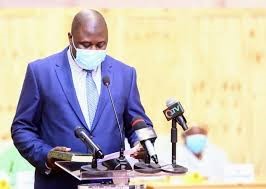By Ndey Sowe
Dawda A. Jallow, the Attorney General and Minster of Justice, assured that he is willing and ready to convene a stakeholder’s consultation meeting between the Ministry of Foreign Affairs and Gambians Abroad, the diaspora leadership and the IEC, to discuss some of the hurdles regarding diaspora voting.
“My Ministry is been the liaison Ministry or Government department in charge of election matters, to look into some of these hurdles referred to above, with a view to finding immediate solutions to them in the short term,” Justice Jallow said at the fifth Stake in the Nation Forum (SNF), held at the Sir Dawda Kairaba Jawara International Conference Center in Bijilo, under the theme “Consolidating and Accelerating National Development”, organised by the Migration and Sustainable Development (MSDG) project in The Gambia.
He said SNF has over the past five years become the central forum for discussion of key issues relevant to the diaspora’s role in national development and their involvement in the political and socio-economic space of the Gambia, fondly dubbed as the 8th region of the country.
“Your leadership is hereby invited to contact my office as soon as they can, to start work immediately in finding solutions to some of these hurdles,” Justice Jallow said.
For the long term, Justice Jallow said President Adama Barrow has repeated his commitment to the constitutional review process and having a new constitution during his second mandate.
“I am therefore confident that once this process gets on the way, we will have the opportunity to actively debate once more, the issues of diaspora voting, and other key issues touching on the diaspora, in light to the significant importance of national development and the social and economic DNA of the country.”
“Section 79 provides for an Act of the National Assembly which shall make provisions for among other things, voter registration in the diaspora. In spite of all these proposed provisions on diaspora voting, some practical and administrative matters will still need to be resolved such as the criteria for selection of countries to host diaspora voter registration and voting centers, and other financial implications of running elections in the diaspora,’’ Justice Jallow remarked.
Regarding the just ended presidential elections, the national debate on diaspora voting according to Justice Minister Jallow, commenced in the months leading up to the elections with efforts made in many quarters, to explore the feasibility of this option. He, however, said that unfortunately, diaspora voting could not be implemented in time for the just ended presidential elections.
“Our current constitution is indeed quite clear on the right to vote, and it provides that: “every citizen of the Gambia being 18 years or older and of sound mind, shall have the right to vote for the purpose of elections for president and national assembly and shall be entitled to be registered as a voter in a national assembly constituency for that purpose,” Justice Jallow stated.
Justice Jallow said from the aforesaid constitutional provision, it does grant the right of every citizen the right to be registered to vote. He, however, cited following the interpretation of this provision, it was realized that the constitution limits such registration for national assembly election.
“National Assembly constituencies are a distinct geographical area demarcated by the Boundaries Commission pursuant to Section 50 of the constitution. This raised practical difficulties regarding the registration of Gambians in the diaspora,” Justice Jallow disclosed.
As observed above, Justice Jallow said voters must belong to and only vote in constituency where they are registered unless they transfer their registration; adding in this respect, the Gambia does not have any national assembly constituencies in the diaspora and any registration of voters outside of the Gambia could potentially be unconstitutional.
Justice Jallow said the Supreme Court strongly state the constitutional rights of citizens to be registered to vote and be voted for in elections; stressing the court did not provide any guidelines for the operationalization of diaspora voting, living divergent views unresolved.
Meanwhile, Justice Jallow said several meetings were held between the IEC, political stakeholders and Government in a bid to explore possible options for the operationalization of diaspora voting; adding it was concluded that this will require a constitutional amendment and an amendment of the Elections Act which was not visible at the time.
“I am happy to note that under the draft constitution, the situation is different. The draft constitution implores on removing the requirement for voter registration to take place within a national assembly constituency,” Justice Jallow said.




















